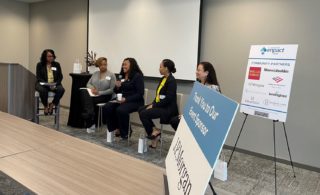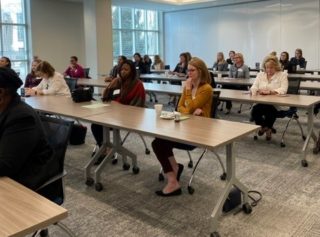The Women LEAD series ended March 22 on a high note. Hosted by community partner, J.P. Morgan in South Park, the room was full of members and guests enjoying time to network, catch up, and hear from a stellar panel. It is hard to capture all that the dynamic and candid conversation covered, but here are some highlights.
 Facilitator, member, and Executive Director of LISC Charlotte, Ralphine Caldwell, kicked off the conversation by asking panel members to explain “what in their dirt” brought them to where they are today in their advocacy journey. The responses ranged from childhood experiences in Bogotá and New York, growing up in subsidized housing in Pittsburgh, finding connections with neighbors who have lived in their homes for 50-60 years, to connections with the literal dirt where relatives sharecropped and worked as enslaved people. The speakers’ honesty and vulnerability were foundational to a powerful discussion that was part testimonial, partly shared experience, and part call to action. Panel members were consultant and community engagement specialist, Janeen Bryant, community advocate; Jada Grandy-Mock, Chief Corporate Community Economic Development Officer at Fifth Third; Rocio Gonzales Zornosa, Executive Director, The Women’s Business Center of Charlotte; and Victoria Watlington, Charlotte City Council District 3 representative.
Facilitator, member, and Executive Director of LISC Charlotte, Ralphine Caldwell, kicked off the conversation by asking panel members to explain “what in their dirt” brought them to where they are today in their advocacy journey. The responses ranged from childhood experiences in Bogotá and New York, growing up in subsidized housing in Pittsburgh, finding connections with neighbors who have lived in their homes for 50-60 years, to connections with the literal dirt where relatives sharecropped and worked as enslaved people. The speakers’ honesty and vulnerability were foundational to a powerful discussion that was part testimonial, partly shared experience, and part call to action. Panel members were consultant and community engagement specialist, Janeen Bryant, community advocate; Jada Grandy-Mock, Chief Corporate Community Economic Development Officer at Fifth Third; Rocio Gonzales Zornosa, Executive Director, The Women’s Business Center of Charlotte; and Victoria Watlington, Charlotte City Council District 3 representative.
 When asked how to be a community advocate, Ms. Grandy-Mock started the conversation by inviting all to “evaluate the spaces and places you occupy”. Think about the seats we hold professionally, personally, on Boards, and in our houses of faith. Jada shared her belief that she is a steward of her executive seat and so uses her voice to educate and inspire change around her — “we have a moral obligation to” make a change. Councilwoman Watlington sees it as a two-part process: seek to understand and use that understanding to influence others. Ms. Gonzales Zornosa started with a call to be present and curious about those around us and a question to ask ourselves: Do we really want change? Ms. Bryant closed out the responses by saying simply, “tell the truth”.
When asked how to be a community advocate, Ms. Grandy-Mock started the conversation by inviting all to “evaluate the spaces and places you occupy”. Think about the seats we hold professionally, personally, on Boards, and in our houses of faith. Jada shared her belief that she is a steward of her executive seat and so uses her voice to educate and inspire change around her — “we have a moral obligation to” make a change. Councilwoman Watlington sees it as a two-part process: seek to understand and use that understanding to influence others. Ms. Gonzales Zornosa started with a call to be present and curious about those around us and a question to ask ourselves: Do we really want change? Ms. Bryant closed out the responses by saying simply, “tell the truth”.
Ms. Gonzales Zornosa discussed her definition of community, noting that embedded in the word community is unity. She asked attendees to consider their world “who is [the] we and who is [the] they?” She then suggested, “allow me to be in your we”. “We have diversity in Charlotte; we need more inclusion.”
While discussing what is next, the panel members agreed that power remains in the hands of a few in Charlotte and that there likely is a correlation between the static nature of the power structure and the lack of progress in solving key problems that persist in the community. There was a clear consensus around the importance of investing and developing capacity in grassroots organizations and leadership. Ms. Grandy-Mock also noted, “we don’t leverage lived experience.” “It is important to hear, see, and acknowledge those experiencing the issues” that we are trying to address.
As the conversation drew to a close, two comments stuck out. Ms. Bryant, speaking about racial equity, said “inclusion can be fun, joyous.” Coming together, learning, and sharing, make for richer experiences. Ms. Watlington summed it up this way, “it’s about connecting on a human level.” The takeaways were many, but key among them was the need to connect with one another, be curious and learn about others, show up and use our voices to promote good change and tell the truth. These women offered much wisdom that can make each of us a better advocate, ally, and community member.


